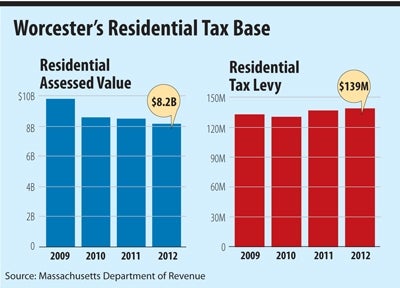Worcester’s Main South neighborhood may face challenges, but it’s come a long way since the mid-1980s when Clark University partnered with neighborhood groups and residents to improve the housing stock and revitalize the area.
So says Jack Foley, vice president of government and community affairs at Clark. Foley has been charged with overseeing the university’s partnership with the neighborhood since 1985, and he knows how valuable a solid neighborhood improvement strategy can be.
“Young faculty find that attractive housing in good neighborhoods is pretty plentiful here, at a good price,” Foley said.
City officials hope private-sector employees such as those at Clark can discover housing opportunities and settle in Worcester. As part of a plan to upgrade the city’s housing stock, the economic development office wants to nudge businesses to design incentive programs to get their employees to buy homes in the city.
In Main South, for instance, older, abandoned properties have been renovated into colorful, like-new housing, which Clark encourages its faculty and staff to live in through a home-buying incentive program.
Those who buy homes and stay in them for five years receive a $5,000 cash credit from Clark, which has prompted 27 employees to buy homes in Main South since 1995, according to Foley. Eleven of those employees live there today.
The city hopes other major employers will follow suit.
Win-Win For Employers And Neighborhoods?
Representatives from the economic development office recently laid out their vision to stimulate the local economy by upgrading the housing stock, and they hope to move forward with a strategy soon.
“It’s valuable to the company to have employees living close by, and it’s valuable to the community to have people living in that community and working in that community,” said city Economic Development Director Timothy McGourthy.
The benefits to the city are fairly obvious. An improved real estate market and larger residential tax base are the city’s main revenue drivers, and having more urban professionals living here means more money will be spent at local business.
But McGourthy believes it’s good for business, too. Having employees close by during weather events, such as Hurricane Sandy last month, is one advantage, according to McGourthy. And he said shorter commute times tend to lower employee attrition.
“I think a lot of (companies) see the value of it,” McGourthy said.
Initially, the city would target the education and health care sectors in Worcester, but beyond that, McGourthy is interested in reaching out to all major employers. The plan doesn’t include incentives for companies willing to take part, but McGourthy is confident businesses will find the approach serves their interests, too.
“I think it’s more just that kind of integration into the local community,” McGourthy said.
Chamber’s Role
The city will partner with the Worcester Regional Chamber of Commerce to form an advisory council that would execute its strategy to upgrade housing, including the residency incentive piece.
Stuart Loosemore, director of government affairs and public policy at the chamber, embraces the plan. He said enticing employees to live within the city should help companies because “an employee doesn’t want to travel 40 miles to their job.”
Loosemore said housing rehabilitation should be one approach to attract new residents, but promoting the city may be even more important.
“We need to seriously market our city better,” Loosemore said.
Tracy Hassett, vice president of human resources at Worcester Polytechnic Institute (WPI), strongly agrees with the notion that the more employees who move to the city, the better.
“I think that definitely helps us with retention,” Hassett said. “If somebody accepts a job and buys a house here, that’s a very serious commitment.” WPI became a participant in the Buy Worcester Now program more than four years ago, which offers down-payment assistance and loan programs for first-time home buyers. Though WPI doesn’t keep records on participation, Hassett said it seems popular among employees. And, she said, WPI may consider pursuing an in-house residency incentive program per the city’s new strategy.
But there are challenges. Hassett said WPI avoids getting too personal in influencing where employees and prospective employees live.
“Part of our job is to sell Worcester as a community, but we don’t tend to get into people’s personal lives,” Hassett said.
A sizeable percentage of WPI employees — 35 percent out of 920 — already reside in Worcester, which Hassett believes is a pretty healthy number.
To Hassett, there are plenty of reasons more employees may choose Worcester, should they be encouraged by new incentive programs, including its central location, cultural attractions and numerous dining options. “I was raised in this area, and I think people that come to Worcester stay here in Worcester. It’s a good place to raise a family,” she said.
Although residency incentive programs can be effective, they’re not useful unless there is adequate available housing, said Stephanie Wasser, executive director of the Urban Land Institute in Boston, which pursues community development and land use initiatives throughout New England.
“The question is: Is the housing stock there for the kinds of jobs you’re talking about?” Wasser said.
Simply put, people will only move to a community if the kind of home that meets their standards is available at the right price, in the right setting. And since the goal of the residency incentive proposal is to upgrade the housing stock, that may indicate that it’s not.
Loosemore thinks there are options. “I think we need to rehabilitate more of the stock to make it more available,” Loosemore said, adding that attracting new residents and upgrading housing “almost have to happen simultaneously.”

